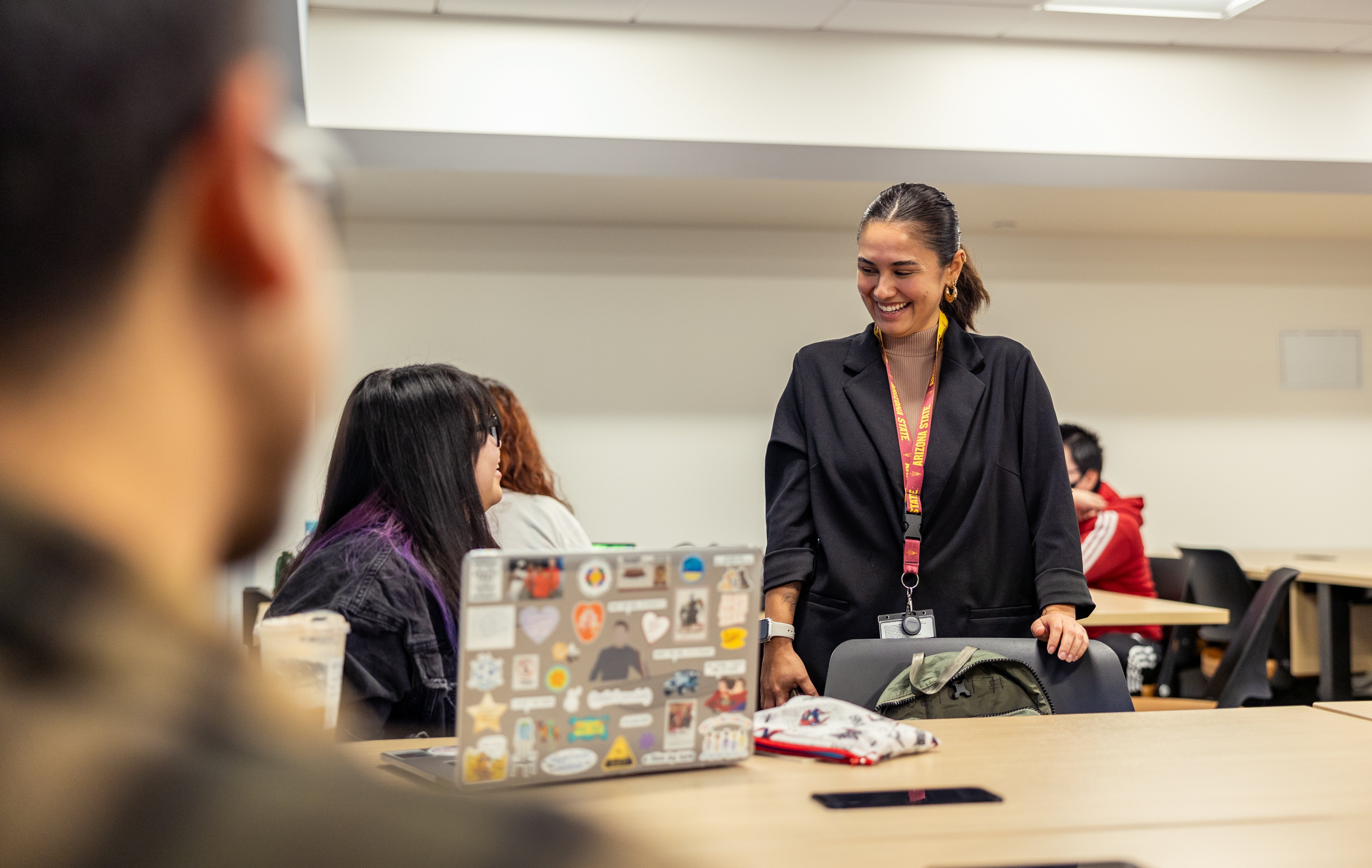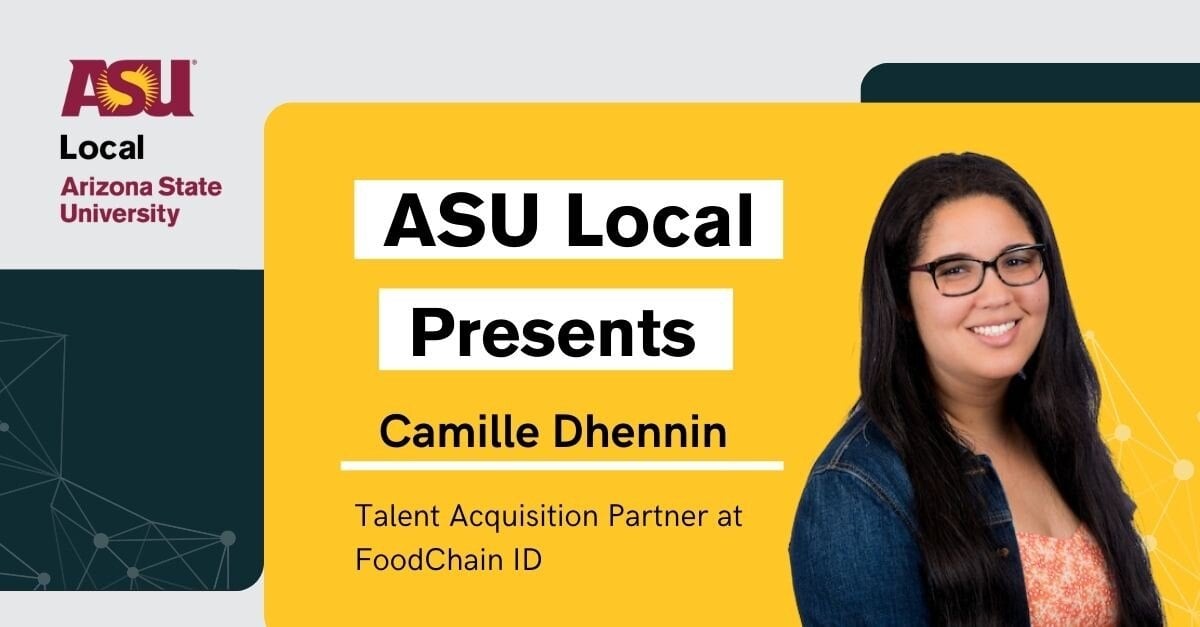
Insider Tips for a Competitive World
Esteemed Talent Acquisition Partner at FoodChain ID, Camille Dhennin's insightful conversation with our students.
Q: Can you tell us about your role as a talent acquisition partner at Food Chain ID and the company's focus in the food industry?
A: We specialize in testing certification and digital solutions for food products, including labels like non-GMO. Our work significantly influences what you see in grocery stores.
Q: What advice do you have for students looking to align their part or full-time job experience, which may not directly relate to their desired industry or major?
A: It's essential to highlight transferable skills. For example, if you worked at a shoe store, don't just mention stacking shoes on your resume; instead, emphasize organizational skills and critical thinking used in managing inventory. Tailor your resume to match the job description you're applying for.
Q: When applying for jobs online, why do some companies require both an online form and a submitted resume and cover letter?
A: It's often due to outdated technology and system limitations, ensuring accuracy and organization. Some systems may not extract information correctly from resumes, so entering it manually serves as a double-check.
Q: Is there a magical Applicant Tracking System (ATS) that automatically scans resumes for keywords?
A: No, there's no magic ATS. While there are knockout questions, resumes are reviewed by recruiters. Large tech companies like Amazon and Google still rely on recruiters rather than fully automated systems.
Q: Does the timing of job applications matter? Should one apply as soon as the job goes live, or does it depend on the industry?
A: It depends on the industry. Corporate positions may require quick applications within the first 24 to 48 hours. However, for some organizations like ASU, they keep positions open until the posted deadline regardless of when you apply.
Q: How can students effectively network when applying for jobs? Is it appropriate to reach out to recruiters before applying?
A: Networking is crucial. Reach out to recruiters with specific questions related to the job description. Be polite, intentional, and research the right person to contact. It's generally advisable to message recruiters before managers.
Q: Can volunteer work open doors for job opportunities beyond the volunteer role itself?
A: Absolutely. Volunteer work not only demonstrates initiative but also allows you to build a network. You'll meet various professionals during volunteering, providing opportunities to expand your connections within the industry.
Q: How can I leverage my connections within ASU, particularly with professors, to enhance my professional opportunities?
A: Building connections with professors at ASU can be valuable for your professional development. Professors often have industry experience and can provide insights into the field. Attend office hours, ask questions about class topics, and gradually build relationships. Professors can also offer guidance on internships and career paths. Don't forget to explore career events hosted by ASU and participate in discussions related to your major to stay informed about potential opportunities.
Q: What role do student clubs and organizations play in building professional connections at ASU?
A: Student clubs and organizations at ASU are excellent networking resources. Engage with peers who share similar interests, as they may have valuable connections or insights. Attend club events, collaborate on projects, and participate in discussions. Networking within your student community can lead to opportunities and connections that extend beyond your academic journey.
Q: What advice is given regarding the value of attending specific career events related to one's major?
A: Identifying and attending career events aligned with your major is crucial for gaining insights into specific career paths. When professionals or organizations relevant to your field visit campus, prioritize attending those events. Whether in-person or remote, these events provide opportunities to learn about industry trends, connect with professionals, and potentially discover internships or job openings.
Q: Why is it important to determine your desired salary before applying for a job?
A: Knowing your desired salary before applying is crucial because it sets the foundation for your negotiations. When asked about salary expectations during the first interview, having a specific number shows confidence and helps avoid being low-balled. This proactive approach ensures that you are transparent about your expectations from the beginning.
Q: How can one use the information gathered during the interview process to negotiate a salary?
A: Pay close attention to what interviewers emphasize as crucial for the job. Use this information during salary negotiations to highlight the value you bring to those specific aspects. For example, if they emphasize remote work experience, showcase your expertise in that area. This can potentially lead to a higher offer or provide strong points for negotiation.
Q: Besides salary, what other aspects of a job offer can be negotiated?
A: Beyond salary, several aspects of a job offer can be negotiated. These include benefits, paid time off, work schedule, additional vacation days, or sick days. Considering the overall package allows for a more comprehensive negotiation strategy. Explore various elements to ensure the offer aligns with both financial and lifestyle preferences.
Q: What advice is given for making meaningful connections and opportunities through networking?
A: Building meaningful connections involves providing context in LinkedIn connection requests, referencing shared experiences or interests, and expressing genuine interest in the other person's profile. When attending events, follow up with personalized notes to remind the connection of your encounter and establish a foundation for future interactions.
Q: Is it acceptable to take time to consider a job offer before accepting it?
A: Absolutely, it's acceptable to take time to consider a job offer. If a company insists on an immediate decision, it can be a red flag. Giving yourself time to think, consult with others, and potentially negotiate is essential. It ensures you make a well-informed decision that aligns with your goals and expectations.
Q: What should you do if a company claims certain elements of the offer are non-negotiable?
A: If a company claims certain elements of the offer are non-negotiable, it's essential to assess your priorities. While some aspects may be fixed, explore negotiations on other factors such as benefits, work schedule, or additional perks. It's about finding a mutually beneficial arrangement rather than a confrontational stance.
Q: How can one address having short-term job experiences on their resume during an interview?
A: When discussing short-term job experiences, focus on the positive aspects and growth. Clearly explain why you left each role, emphasizing the desire for continuous learning and skill development. Avoid negative comments about previous employers or work challenges. Presenting the changes as intentional steps toward career development can help mitigate concerns.
Q: What are the potential pitfalls of being too open about dissatisfaction with a previous job during an interview?
A: Being too open about dissatisfaction with a previous job can raise red flags during an interview. Negative comments about managers, coworkers, or the workload may create concerns about your attitude and adaptability. It's advisable to sugarcoat and spin these experiences, emphasizing positive aspects and lessons learned, to present a more constructive narrative.
Q: What are common pitfalls in questions asked by applicants during interviews?
A: Questions that could have been easily answered through research or were already addressed in the job description are considered poor. Good questions focus on aspects not readily available, such as company culture, reasons to join the organization, or potential challenges. Avoiding questions that could be perceived as easily answerable through basic research is key.
Q: Can you provide examples of good questions applicants can ask during an interview?
A: Good questions focus on company culture, reasons employees enjoy working there, and potential challenges. Asking about the work environment, team dynamics, or the interviewer's personal experience at the company can be insightful. A thought-provoking question could be, "Why wouldn't I want to work here?" to understand potential drawbacks and gain a more nuanced view of the organization.
To learn more about Camille Dhennin, find her on LinkedIn.
Learn about our career workshops here.
